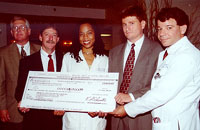Bradham named third Novartis student fellow
by Cindy AbolePublic Relations
College of Medicine student William Bradham was named the third recipient of the Novartis Medical Student Fellowship award. The year-long fellowship allows a medical student to explore his or her interests in cardiovascular research at MUSC.
“In this era of clinical pressures and competitiveness, it's nice that Novartis and MUSC can work together to involve students in the advanced understanding of cardiovascular disease,” said Francis G. Spinale, M.D., Ph.D., professor of medicine, Division of Cardiothoracic Surgery. “It re-emphasizes why we're here.”
 Novartis
pharmaceutical representatives Sam Ehrlich, far left, and Ken Rakestraw
congratulates MUSC/Novartis Medical Student Fellowship recipients Allyson
Walker, 1999 and William Bradham, 2000. Also joining the group is
fellowship sponsor Dr. Francis Spinale with the Division of Cardiothoracic
Surgery.
Novartis
pharmaceutical representatives Sam Ehrlich, far left, and Ken Rakestraw
congratulates MUSC/Novartis Medical Student Fellowship recipients Allyson
Walker, 1999 and William Bradham, 2000. Also joining the group is
fellowship sponsor Dr. Francis Spinale with the Division of Cardiothoracic
Surgery.
Bradham, who previously earned history and geology degrees from the University of South Carolina, follows former Novartis fellow and College of Medicine student Allyson Walker. She will return to clinical rotations as a third-year student. Each year, Novartis sponsors other research awards. The Novartis award is valued at $41,200.
“I chose medicine as a career because it allows me to help people,” said Bradham, who is originally from Columbia. “Dr. Spinale's a great teacher who brings a lot of opportunity to his staff and students.”
Since 1997, Novartis has sponsored this institutional award to rising third-year medical students who want to conduct cardiovascular research and explore medical research. Novartis is a world leader in health care, which manages businesses in pharmaceuticals, consumer health, generics, eye care and animal health.
In the first weeks of the program, the student will rotate among various cardiovascular research programs and choose from any of the specialty areas—Cardiology, Cardiothoracic Anatomy and Pharmacology—to develop a schedule of research objectives and project outlines throughout the fellowship.
During her fellowship, Walker was able to study the effects of the peptide Endothelin and its function with regulating blood pressure for patients who undergo cardiopulmonary bypass surgery.
Walker was able to expand on her benchside experience through the 1999 Lifeline Foundation Fellowship and the National Medical Fellowship in Academic Medicine for Minority Students.
Within the Palmetto State, cardiovascular disease and stroke rank as
the top leading cause of death among South Carolinians. Spinale credits
physicians with making more than 75 percent of today's major medical discoveries.
“It's important that programs like these support students who have a desire
for medical discovery,” he said.